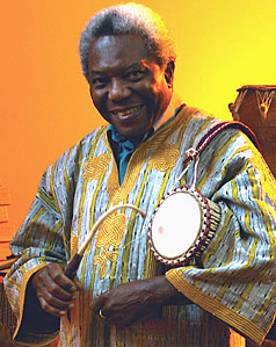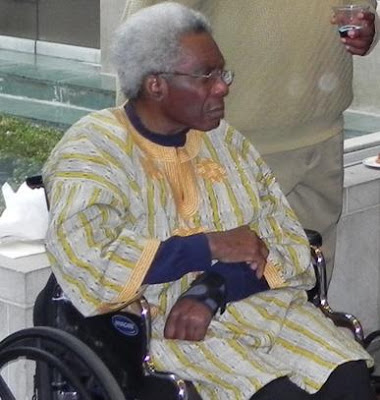Home
Blog
Composers
Musicians
Black History
Audio
About Us
Links
Composers:
Adams, H. Leslie
Akpabot, Samuel Ekpe
Alberga, Eleanor
Bonds, Margaret Allison
Brouwer, Leo
Burleigh, Henry Thacker
Coleridge-Taylor, Samuel
Cunningham, Arthur
Dawson, William Levi
Dede, Edmund
Dett, R. Nathaniel
Elie, Justin
Ellington, Edward K. "Duke"
Euba, Akin
Garcia, José Mauricio Nunes
Hailstork, Adolphus C.
Holland, Justin
Jeanty, Occide
Johnson, James Price
Joplin, Scott
Kay, Ulysses Simpson
Khumalo, Mzilikazi
Lambert, Charles Lucien, Sr.
Lambert, Lucien-Leon G., Jr.
Lamothe, Ludovic
Leon, Tania
Moerane, Michael Mosoeu
Perkinson, Coleridge-Taylor
Pradel, Alain Pierre
Price, Florence Beatrice Smith
Racine, Julio
Roldan, Amadeo
Saint-Georges, Le Chevalier de
Sancho, Ignatius
Smith, Hale
Smith, Irene Britton
Sowande, Fela
Still, William Grant
Walker, George Theophilus
White, José Silvestre
Williams. Julius Penson
AfriClassical Blog
Companion to AfriClassical.com
Guest Book
William J. Zick, Webmaster,
wzick@ameritech.net
©
Copyright 2006 - 2022
William J. Zick
All rights reserved for all content of AfriClassical.com
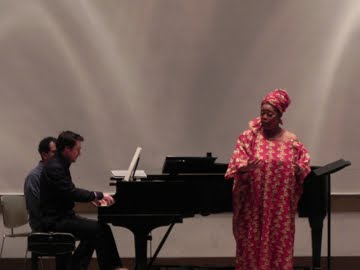
Soprano Dawn Padmore sings
Noliwe's aria from Chaka
at University of Pittsburgh retirement party of Dr. Akin Euba
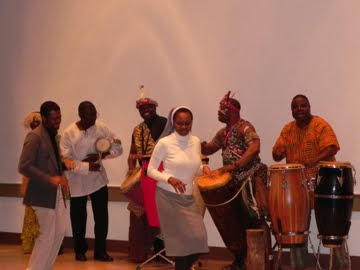
Afrika Yetu, Oyebade Dosunmu and Sr.
Marie Agatha Ozah at Dr. Akin Euba's retirement party at University
of Pittsburgh
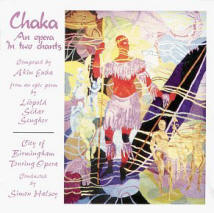
Chaka: An opera in two chants
City of Birmingham Touring Opera
Simon Halsey, Conductor
Music Research Institute MRI-0001CD (1998)
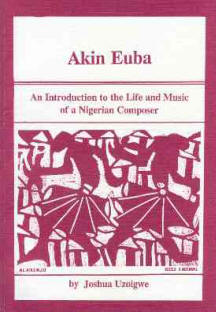
Akin Euba: An Introduction to the
Life and Music of a Nigerian Composer
Joshua Uzoigwe
Bayreuth African Studies Series (1992)
|
Home ->
Composers ->
Euba, Akin
Français
Audio Sample:
Music Research Institute MRI-0001CD (1998); Chaka: An
opera in two chants; City of Birmingham Touring Opera; Simon
Halsey, Conductor Part VI - "Why do you not dance"
1 Birth
Akin Euba was born in Lagos, Nigeria on April 28, 1935 and spent
his early years there. He is a member of the Yoruba ethnic
group. His biography is Akin Euba: An Introduction to the Life
and Music of a Nigerian Composer by Joshua Uzoigwe. It is a 1992
publication of the Bayreuth African Studies Series, edited by
Prof. Eckhard Breitinger. It explains that his father was an
amateur musician:
|
Akin Euba's father, Alphaeus Sobiyi Euba, was in his
youth an active musician (although music was not his
profession). He was a chorister at the Olowogbowo
Methodist Church (now Wesley Cathedral) Lagos and also
played the clarinet in the Triumph Orchestra, a Lagos
dance band in which Fela Sowande (who later became
internationally famous as a composer)was the pianist.
Akin Euba's mother, Winifred Remilekun Euba, née Dawodu,
was a teacher by profession. |
2 Traditional Music
The author refers to a 1974 dissertation for examples of the
types of traditional music which were common in the composer's
childhood:
|
In his dissertation on Dundun Drumming of the Yoruba
(Euba 1974) he gives an account of some of the
traditional music types and events that were popular in
those early periods of childhood. These include types
such as waka and apala. Akin Euba describes waka as a
socio-religious song, of Islamic origin, which later
became entertainment music, accompanied on dundun drums.
This music (in which female singers are supported by
male instrumentalists) is
usually employed in marriage, child-naming, and funeral
ceremonies. Apala, which is
performed only by men, also has some links with Islam.
Like waka it is very much influenced by dundun drumming. |
3 Piano Lessons
Akin Euba received his first piano lessons from his father,
beginning in 1943. His father clearly expected him to make music
his profession. Euba's second piano teacher was Major J.G.C.
Allen, a British civil servant with whom he began instruction in
1948. Euba won first prize at the First Nigerian Festival of the
Arts in 1950. Josua Uzoigwe continues:
|
After 1950 Major Allen sent Akin Euba to a Monsieur
Tessier Rémi du Cros, the then French Consul in Lagos,
who taught him for a while, following which he returned
to Major Allen before travelling to the United Kingdom
in September 1952. He had left the C.M.S. Grammar School
nine months earlier. |
4 Trinity College of Music
After two years of study at Trinity College of Music, Euba
changed his program to allow himself to concentrate on courses he
considered of more value to his future career. His biographer
recounts:
|
These subjects included piano, composition, harmony and
counterpoint, orchestration, organ and score-reading.
One teacher who influenced him a great deal at the
College was Eric Taylor, with whom he studied harmony
and counterpoint for some time. Taylor saw much
potential in Akin Euba's arrangements of Nigerian folk
songs and encouraged him to do them. The first of
such arrangements were, therefore, done when Akin Euba
was a student.
...
Another person who gave him much encouragement at the College was his
composition teacher Dr Arnold Cooke, a
pupil of Paul Hindemith. The report which
Cooke gave Euba at the end of the first term as his
teacher bore the grade 'excellent' with the comments
that Akin Euba was a gifted student. This, in Euba's
opinion, reinforced in no small way his desire to become
a composer. |
In four years at Trinity College of Music, Akin Euba earned
three degrees:
|
They are Associate of the Trinity College
London (Piano Performance) 1954; Licentiate of the
Trinity College London (Teacher's Training Diploma) 1955;
and Licentiate of the Trinity College London (Piano
Performance) 1956. |
5 Early Works
Uzoigwe tells us Akin Euba regarded his first major composition
to be a 1956 work, Introduction and Allegro for Orchestra.
He earned Fellowship diplomas at the College in 1957 in
Composition and Piano Performance. Euba submitted a string
quartet for the Composition Fellowship. He went back to
Nigeria in 1957 and served as a Senior Programme Assistant
(Music) at the Nigerian Broadcasting Corporation until his
promotion to Head of Music in 1960. The author continues:
|
Two works which were written as a result of his
experiences at this time are Six Yoruba Songs for
voice and piano, and Two Yoruba Folk Songs for
unaccompanied choir. They were both completed in 1959.
In the same year that he was promoted as Head of Music
(1960), Akin Euba wrote another work entitled The
Wanderer for violoncello and piano. |
The biography quotes Akin Euba's comments on The Wanderer:
|
"Hitherto," he confirms, "It was in arrangements of folk
songs that I made use of African material. My
original compositions were composed in European terms.
The Wanderer was the first composition in which I
attempted to explore elements of African music." |
His position in broadcasting contributed to performances and
recordings of some of Euba's early compositions.
6 UCLA
In 1962 Akin Euba received a fellowship in ethnomusicology which
had a major impact on his development as a composer, as we learn
from the biography:
|
While still in the employ of the Nigerian Broadcasting
Corporation, he received a Rockefeller Foundation
fellowship in 1962 to study ethnomusicology at the
University of California, Los Angeles. His arrival at
UCLA towards the end of that year marked, according to
Akin Euba, a turning point in his career. He was
to be introduced to different musical cultures from many
parts of the world, and, as time went on, he was to
acquire a deep theoretical knowledge of African music.
...
After an incubation period of one year or so, during
which he absorbed the 'theoretical means' mentioned
above, Akin Euba began to seek to develop what he
considered an African idiom. |
7 Developing an Idiom
Joshua Uzoigwe tells us of the works Akin Euba composed while
trying to develop an African idiom:
|
The earliest works in this new attempt include Igi
Nla So for piano and four Yoruba drums, and Three
Yoruba Songs for baritone, piano and Iyaalu (Yoruba
'talking drum' of the dundun tension drum family). Other
works written in 1963 include Five Pieces for
English horn and piano, and Dance to the Rising Sun.
The latter is an orchestral piece which was commissioned
by Robert Boudreau, who conducted the American Wind
Symphony Orchestra at the work's premiere that same
year.
According to Akin Euba, in spite of these
early efforts at composing in an African idiom, he could
"not find the key to this idiom". But he felt all
along that the key was being gradually revealed by his
continued study of the theoretical basis of African
traditional music and exposure to the traditional music
of other peoples, and, especially, by his interaction
with other composers at UCLA who were also involved with
the study of non-Western music. |
8 Composing for Piano
The author points out that the composer focused on works for
piano in 1964:
|
His last academic year as an undergraduate at UCLA was
that of increased influx in creative activities,
particularly in writing for the piano. Akin Euba
explains the reasons for this as follows:
"I believe that my producing many works for the piano in
1964 resulted from (1) my need to have things which I
could play by myself and (2) my wish to explore the
'African'/percussive aspects of the piano. I was
at that time just beginning to develop the idea of
'African pianism', a style of piano playing which is as
distinct as a jazz pianism or a
Chopinesque pianism."
...
The piano works that he wrote in 1964 include Four
Pictures from Oyo Calabashes, Impressions from an
Akwete Cloth, and Saturday Night at Caban Bamboo.
The other works of this same year in which piano is
combined with other instruments are Tortoise and the
Speaking Cloth for narrator and piano, and Four
Pieces for flute, bassoon, piano and percussion. |
9 Bachelor's Degree
Euba graduated Cum Laude with a B.A. degree in Music, and
returned to Nigeria, at the end of the 1963-64 school year,
Uzoigwe writes, but registered at UCLA again in late 1965, this
time in the Masters degree program in Composition. During the
interim, Euba had written Abiku I, to be performed on Nigerian
instruments. The author continues:
|
According to Akin Euba, it was written for a dance-drama
(choreographed by Segun Olusola), involving a solo
dancer, which was video-taped by the Nigerian Television
Authority (formerly NBC-TV) and presented at the
Salzburg Congress of the International Music Centre on
"Dance, Ballet and Pantomime in Film and TV" in 1965.
The music and dramatization of Abiku I were
based, he says, on J.P. Clark's poem on the theme of
abiku (a child "born to die"), although the text itself
was not used. J.P.Clark is a Nigerian poet and
playwright and a contemporary of Akin Euba. |
10 Master's Degree
Akin Euba left his position with the Nigerian Broadcasting
Corporation when he returned to UCLA to earn a Master's degree.
Uzoigwe adds:
|
He now
set out to compose another series of pieces for an
African orchestra as part of his thesis for a Master's
degree in 1966. |
The new
collection was called Four Pieces. The book continues:
|
On
completion of his Master's degree at UCLA in 1966, Akin
Euba joined the University of Lagos as a lecturer in
music, and within that same year he attended two music
conferences in Bloomington, Indiana, and Legon, Ghana. |
11 Research
His biographer tells us Akin Euba's teaching duties were light
enough that he was able to do research in Ethnomusicology:
|
While at the
University of Lagos, Euba was attached to the School of
African and Asian Studies, where his teaching duties
were minimal. He was therefore able to concentrate on
research and creative work.
...
In fact, in 1967, he registered with the
University of Ghana as a Ph.D. student in
ethnomusicology.
From 1967 onwards, Akin Euba began to
acquire, through his research, a deeper
knowledge of the music of his culture, which he in turn
employed as an aid to his creative experiments. A piece
of work which marks the beginning of this phase is
Olurounbi, a tone poem for symphony orchestra.
In 1966 he had written what appears to be a prelude to
this work. The earlier work was titled Legend,
and scored for violin, horn, piano, and percussion. The
symphonic tone poem
of 1967 is based on a Yoruba legend (see explanation in
Chapter 4), and was performed in that year by the
Portland Maine Symphony Orchestra conducted by Arthur
Lipkin. |
12 Articles
Akin Euba composed two other works in 1967, Uzoigwe tells us:
(1) Morning, Noon and Night for Nigerian instruments, performed
in 1967 in Edinburgh by Theatre Express of Lagos. (2) Wind
Quintet, performed in Nairobi in 1967 by the Bavarian Wind
Quintet. Music was not all Euba produced that year; he also
published two theoretical articles on music in Africa. Multiple
Pitch Lines in Yoruba Choral Music appeared in the Journal of
the International Folk Music Council, XIX. In Search of a Common
Language of African Music was published in Interlink, III,iii. Akin Euba was founder and editor of the journal
Nigerian Music
Review, and established a series called Ife Music Editions to
publish music composed by Africans. Joshua Uzoigwe tells us Euba
subsequently wrote a number of music journal articles on his
ideas:
|
They
include such titles as "Creative Potential and
Propagation of African Traditional Music" (Euba 1972),
"Traditional Elements as the Basis of New African Art
Music" (Euba 1970c), "Music Adapts to a Changed World"
(Euba 1970a), "The Potential of African Traditional
Music as a Contemplative Art" (Euba 1974), and the
"Criteria for the Evaluation of New African Art Music"
(Euba 1975a). |
13 Books
Prof. Akin Euba's curriculum vitae says he is the author of four
books and the co-editor of another three volumes:
|
Euba is
the author of four books, including Yoruba Drumming: The
Dundun Tradition, and co-editor of three books in the
series titled Intercultural Music. |
14 African Pianism
His curriculum vitae also includes autobiographical notes which begin
as follows:
|
Akin
Euba, who comes from Nigeria, divides his time between
composition and scholarly work and considers himself to
be a disciple of Bela Bartok. Since 1970, he has
pioneered several theories of composition, the best
known of which is that of African pianism. This
concept has been adopted by some of the most important
contemporary African composers, such as J.H. Kwabena
Nketia, Joshua Uzoigwe and Gyimah Labi. The concept is
articulated in several of Euba’s works for the piano,
including Scenes from Traditional Life (1970) which has
been performed extensively in various parts of the
world. |
15 Creative Ethnomusicology
Dr. Euba's autobiographical notes continue with a definition of
his theory of creative ethnomusicology:
|
Another
of Euba’s theories, creative ethnomusicology, was the
subject of an inaugural lecture which he delivered in
the University of Pittsburgh in March 2000, in his
position as the Andrew W. Mellon Professor of Music at
the University. As defined by Euba, creative
ethnomusicology is a process whereby information
obtained from music research is used in composition
rather than as the basis of scholarly writing. |
16 Chaka CD
Akin Euba's curriculum vitae observes that his creative concepts
have no better representation than the opera Chaka. He explains
in the liner notes of Chaka, MRI 0001CD (1999):
|
This
recording is a revised version of the
opera that was premiered in a semi-staged format by the
City of Birmingham Touring Opera in September 1995,
during Africa 95, a three-month long celebration of
African arts that took place in various parts of the
United Kingdom.
...
Briefly stated, Chaka is a fusion of 20th century
techniques of composition with stylistic elements
derived from African traditional music, particularly the
music of the Yoruba of southwestern Nigeria. Moreover,
the orchestra is a combination of African and Western
instruments. |
17 Narrative
The liner notes by Akin Euba give this account of the events
portrayed in the opera Chaka:
|
The
epic poem by Senghor is based on the real life story of
Chaka, a 19th century king of the Zulu who achieved fame
as a brilliant military strategist and empire builder
but was also notorious for crimes against humanity.
The
poem is in two parts, subtitled Chant 1 and Chant 2 and
in designating Chaka as an opera in two chants (rather
than two acts) I follow Senghor's example. The vocal
parts of the opera are in any case written in a style
that is akin to that of the chant mode of Yoruba music
(in its free rhythm, but not speech-song, aspects).
In the prelude to Chant 2, I include "Man and the
Beast," also a poem by Senghor (but not part of the
Chaka poem).
Senghor's poem covers the last moments of Chaka's life.
In Chant 1, the hitherto
invincible Chaka has been assassinated by some of his
own people and lies dying from his wounds. He is
cross-examined by a White Voice (who is a dual symbol of
the missionary and colonial presence in Africa).
The White Voice denounces Chaka as a blood-thirsty tyrant who murdered Noliwe, his
wife-to-be, in order to gain absolute power, and also
caused the slaughter of millions, including pregnant
women and children. Chaka's defence is that every
act of his was performed for the love of his
black-skinned people.
Chant 2 is a love song in which Chaka remembers tender
moments with his beloved Noliwe, while a chorus chants
in praise of Chaka. |
Further
information on Chaka is available in the author's notes
at the Website AfricanChorus.org:
http://www.africanchorus.org/Voam/Voam643.htm
18 References
The liner notes of the Chaka recording list these references for
the opera:
|
Euba,
Akin. Essays on Music in Africa 2: Intercultural
Perspectives. Bayreuth: Bayreuth African Studies Series.
(1989)
Uzoigwe, Joshua Akin Euba: An Introduction to the Life
and Music of a Nigerian Composer. Bayreuth:
Bayreuth African Studies Series. (1992)
Léopold Sédar Senghor, first president of
Senegal and doyen of modern African writers, originally
published "Chaka" and "Man and the Beast" in French. The
English translations used in the opera are not included
in these notes and may be found in the OUP publication
cited above. The Yoruba texts of the opera were written
or derived from various traditional sources by Akin
Euba. They are included here with parallel translations
in English. |
19 Nigerian Art Music
Nigerian Art Music is an overview of classical music by
Nigerian composers. The author is Olabode Omojola, Ph.D.
Artists featured include Samuel Ekpe Akpabot, Fela Sowande and
Akin Euba. All three are profiled at this Website. Dr. Omojola
begins his analysis of Akin Euba with these words:
|
Like
Sowande, Akin Euba's ideas on the need for African
composers to maintain a strong link with traditional
African traditional music have been reflected both in
his compositions and research work. Clear parallels
often, therefore, occur between his writing and his
composition. The writing shows Euba's strong commitment,
far beyond that of any of his colleagues, to a search
for a contemporary African society. |
20 Positions
Dr. Euba has been a lecturer, visiting fellow, and external
examiner at a variety of universities in Africa and North
America. His first position as Lecturer at the University
of Lagos in Nigeria extended from 1966-68. From 1968-75,
he was a Senior Research Fellow at the University of Ife in
Nigeria. He spent the Summer of 1969 at Howard University
in Washington, D.C. Assignments as External Examiner
involved both the University of Ife and Makerere University in
Uganda. Dr. Euba was a Professor at the University of Lagos
from 1978-81. He spent five years as a Research Scholar at the
University of Bayreuth in Germany, from 1986-91. Among
other appointments, he was Director of the Center for
Intercultural Music Arts in London, which he founded, in 1988.
Subsequent positions listed on his curriculum vitae include:
|
1992-94
External Examiner, University of
Ghana, Legon.
1992-94 Secretary-General of the Commonwealth Music
Association
1993 (October) - 1996 (September)Honorary Visiting
Professor, Department of Music, City University, London.
1993 (January) - 1996 (April) Visiting Andrew Mellon
Professor of Music, University of Pittsburgh
1994 Appointed by the Center for Black Music Research,
Chicago, as a member of the Advisory Board for a
Dictionary of Black Composers being published by the St.
James's Press.
1996 (September) Appointed Andrew Mellon Professor of
Music, University of Pittsburgh
1996-97 External Examiner, University of
Ghana, Legon. |
21 University of Cambridge
His curriculum vitae recounts his work on a new composition
while he was an overseas fellow of the University of Cambridge
in the 2000-2001 academic year. It also gives the time and
circumstances of the work's subsequent premiere in New Orleans:
|
Euba
spent the 2000-2001 academic year as an overseas fellow
of Churchill College, University of Cambridge. While at
Cambridge he worked on a major new composition,
Orunmila’s Voices: Songs from the Beginning of Time, a
music drama for soloists, chanters, chorus, dancers and
symphony orchestra, which received its world premiere in
New Orleans on 23 February 2002, during the
second annual international festival of African and
African American music (FESAAM 2002). |
22 Ensemble Noir
Ensemble Noir is a professional organization in Toronto which is
devoted to "cultural diversity in contemporary classical music",
as indicated at its website. In his curriculum vitae,
Dr. Euba recounts his 10 days as a composer-in-residence with
the group:
|
During
the spring semester of 2003, Dr Euba spent ten days in
Toronto as a composer-in-residence with the Ensemble
Noir, during which several of his works were performed,
including three movements from Orunmila’s Voices, in new
arrangements for various chamber ensembles. |
23 University of Pittsburgh
Akin Euba was the Andrew W. Mellon Professor of Music at the
University of Pittsburgh until he retired in the Spring of 2011. His fields
were African Music,
Composition and Piano Performance, according to his faculty Web
page:
http://www.music.pitt.edu/faculty/euba
The page adds that Dr. Euba's biography has been published in
the New Grove Dictionary of Music and Musicians, 2d ed., 2001;
and in the International Dictionary of Black Composers, 1999.
24 Africa
and the Diaspora
Prof. Euba's curriculum vitae recounts his change of
concentration in the past several years from global
interculturalism to connections between Africa and the Diaspora:
|
In
recent years Euba has moved away from general issues on
world interculturalism (with which he has been involved
since 1988) to focus on links between Africa and the
Diaspora. This new orientation is reflected in most of
his recent and current projects, for example the
international symposia and festivals on African pianism
(Pittsburgh 1999) and on composition in Africa and the
Diaspora (Cambridge 2001) which were organized by him. |
25
A Bridge Across
AfricanChorus.org has published Profile: Akin Euba at its
Website:
http://www.africanchorus.org/Voam/Voam644.htm It
touches on a
project Euba started in 1993:
|
Since
joining the University of Pittsburgh in 1993, Euba has
initiated a new project, entitled A Bridge Across:
Intercultural Composition, Performance, Musicology,
which is an extension of Euba’s London activities and is
designed to spotlight the works of composers, performers
and musicologists through recitals, workshops, lectures,
residencies and so forth. |
Dialogue in
Music Project: Africa Meets North America was a
festival and symposium at UCLA, Oct. 22-25, 2009.
Classical artists who participated included pianist Girma
Yifrashewa of Ethiopia, Liberian-born soprano Dawn Padmore,
Jamaica-born pianist Maxine Franklin, British-born pianist
Richard Thompson, and flute player Laura Falzon, born in Canada
to Maltese parents.
26 Acknowledgment
The Webmaster
gratefully acknowledges permission to use the Works List,
Bibliography and Electronic Resources compiled by Dr. Dominique-René
de Lerma, Professor of Music at Lawrence University in Appleton,
Wisconsin. Prof. De Lerma has been publishing on Black Classical
Music for four decades, and is a former Director of the Center
for Black Music Research at Columbia College, Chicago,
http://www.colum.edu/cbmr
27 Works
Collections:
Towards an African pianism; collected works for the keyboard,
1964-1997. Projected.
Individual titles:
A Yoruba folksong, for flute, harp, viola & percussion.
Àbíkú, no. 1, for African instrumental ensemble (1965)..
Àbíkú, no. 2, for textless chorus & African instrumental
ensemble (1968).
Alatangana, ballet. for singers, dancers & Nigerian instruments
(1975).
Amici, for string quartet.
Below Rusumo Falls, for voice, dancer, kayagum, flute, drums &
piano. Text: Olusola Oyeleye. Commssion (poetry): Barbican
Education. Première: 2003/VIII/3, University of Cambridge,
Churchill College, Wolfson Hall Auditorium; Dawn Padmore,
soprano; Hee-sun Kim, kayagum; Laura Falzon, flute; Darryl
Hollister, piano; Radiu Ayandokun, drums; Omotolani Sarumi,
dancer; Bongani Ndodana, conductor.
CD: Dawn Padmore, soprano; Laura Falzon, flute; Hee-sum Kim,
kyagum; Anicet Mundundu, drums; Darryl Hollister, piano
(2003/VIII/03; Churchill College, University of Cambridge).
Black Bethlehem, for soloists, chorus, Nigerian drums & jazz
ensemble (1979).
Chaka, opera in two chants, for 2 sopranos, tenor, 2 basses,
chorus and orchestra with African instruments (1970, rev. 1999).
Text: Léopold Sédar Senghor, after the novel, Shaka the Zulu, by
Thomas Mofolo (1925)?== Première: 1995/IX; Birmingham UK;
Symphony Hall. Dedication: Morenike, the composers daughter.
Duration: 61:16.
CD: Daniel Washington (Chaka); Richard Halton (White voice);
Mauren Brathwaite (Noliwe); Jæláadé Pratt (Praise chanter);
Sarah Jane Wright (Leader of the chorus); Olúêọlá Oyèléyę
(Isanussi); City of Birmingham Touring Opera; Simon Halsey,
conductor. Music Research Institute MRI-0001 CD (1999). Liner
notes unsigned.
----- Noliwe's aria
CD: Dawn Padmore, soprano; Darryl Hollister, piano (Churchill
College, University of Cambridge, 2003/VIII/4).
----- Themes from Chaka, no. 1 (1996 == or 1966?). Duration:
5:50.
CD: Eric Moe, piano (2001/VIII/06).
CD: Darryl Hollister, piano (2001/III). Interntional Consortium
for the Music of Africa and its Diaspora. FESAAM 2001.
----- Themes from Chaka, no. 2, for piano. Première:
2003/VII/02; Churchill College, University of Cambridge; Darryl
Hollister, piano.
CD: Darryl Hollister, piano (2003/VIII/02; Churchill College;
University of Cambridge).
Dirges, for speakers, dancers, soloists & African instruments
(1972). Première: 1972; Munich; Olympics.
Festac 77 anthem, for chorus & jazz ensemble (1977). Première:
1977; Lagos; Second World Festival of Black and African Arts.
Text: Margaret Walker.
Ice cubes, for string orchestra. (1970).
Igi n/a so, for 4 Yoruba drums & piano (1953). ==oriki scores
Impressions from Akwete cloth, for piano (1964).
Introduction and allegro, for orchestra (1956).
Legend of Olurounbi, for orchestra. Première: by 1967; United
States.
Morning, noon, and night, for singers, dancers & Nigerian
instruments (1967).
Music for horn, violin, percussion & piano.
Olurombi, [2] for orchestra (1967). Première: 1967; Portland
Symphony Orchestra [ME] Arthur Bennet Lipkin, conductor.
Orumillas voices; songs from the beginning of time (2002).
4 Pictures from oyo calabashes, for piano (1964).
4 Pieces, for flute, bassoon, Nigerian instruments & piano
(1964).
4 Pieces for African orchestra (1966).
Quartet, strings (1957).
Quintet, winds (1967).
Saturday night at Caban Bamboo (1964).
Scenes from traditional life, for piano (1970). Ile-Ife:
University of Ife Press, 1970. Contains 3 movements. Dedication:
J. G. C. Allen.
CD: Glen Inanga, piano (2003/VIII/1, Churchill College,
University of Cambridge).
Study in African jazz, no. 2; a song for Darelee (2000)
CD: David Keberle, clarinet; Eric Moe, piano (2001/VIII).
Study in African jazz, no. 3, for piano. Commission: Eric Moe.
CD: Eric Moe, piano.
The wanderer, for violoncello & piano
----- for piano trio (1960).
2 Tortoise folk tales, for narrator & Nigerian instruments
(1975).
Wakar duru; 3 Studies in African pianism (1987). 1. Study 1; 2.
Study 2. Première: 1993/I/29, Nigeria; University of Ilorin,
Performing Arts Courtyard; Godwin Sadoh, piano.
----- 1.
CD: Darryl Hollister, piano (2001/VIII/06, Universty of
Cambridge). DSL 003.
----- 3.
CD: Darryl Hollister, piano (2001/VIII/06, Universty of
Cambridge). DSL 003.
2 Yoruba folk songs, for chorus (1959).
6 Yoruba folksongs, for voice & piano (1975 == or 1959?). 1. Mo
lè jiyán yo; 2. Òré méta; 3. Mo já wé gbé gbé; 4. Omo jòwó; 5.
Agbe; Ó se gbé na?
CD: Joyce Adewumi, soprano; Darryl Hollister, piano
(2001/VIII/06).
6 Yoruba songs, for voice & piano (1959).
3 Yoruba songs, for baritone, lyalu & piano (1963). ==? Oriki
scores ==
28 Bibliography
1971 prize winners; Dance, music, drama in African arts, v5n3
(1972/winter) p8-11.
Alatangana in African arts, v5n2 (1972/winter) p46-47.
Dr. Éubàs tours in Music rap, v2n6 (1985/III) p15-16.
Adégbìé, Adémçlá. The present state of development of African
art music in Nigeria in African art music in Nigeria, ed, by
Mosúnmợlá A Omíbíyì-Obidike. Ibadan: Stirling Horden, 2001,
p77-92.
Baldacchino, John. An analytical review of Akin Éubàs
Modern African music and Joshua Uzoigwes Akin Éubà; An introduction to
the life and music of a Nigerian composer in Commonwealth music
(1966) p2-5.
Black music research journal, 1981-1982, p147
Black perspective in music, v4n1, p105; v5n1, p105; v6n1, p99.
Bull, Storm. Index to biographies of contemporary composers,
vol. 3. Metuchen: Scarecrow Press, 1987. xxiv, 854p. ISBN
0-8108-1930-9.
Carter, Madison H. An annotated catalogue of composers of
African ancestry. New York: Vantage Press, 1986.
Clague, Mark. Éubà, Akin in International dictionary of Black
composers, ed. by Samuel A. Floyd, Jr. Chicago: Fitzroy
Dearborn, 1999, v1, p424-432.
Éubà, Akin. An introduction to music in Nigeria on Nigerian
music review, n1 (1977) p1-38.
Éubà, Akin. Concepts of neo-African music as manifested in the
Yoruba folk opera in The African diaspora; A musical
perspective, ed. by Ingrid Mondon. New York: Routledge, 2003,
p207-241.
Éubà, Akin. New idioms of music-drama among theYoruba; An
introductory study in 1970 yearbook of the International Folk
Music Council, ed. by Alexander L. Ringer. Urbana-Champaign:
University of Illinois Press, 1971.
Éubà, Akin. Nigerian music in Nigerian magazine (1960).
Éubà, Akin. Text setting in African composition in The landscape
of African music, ed. by Abiola Irele. Special issue of Research
in African literatures, v32n2 (2001), p119-132.
Éubà, Akin. The interrelationship of music and poetry in Yoruba
tradition in Yoruba oral tradition, ed. by Wandé Abímbæçlá.
Ilé-Ifè: University of If`, Department of African Languages and
Literature, 1975.
Éubà, Akin. Themes from Chaka; A pianistic realization of
African polyrhythm in Towards an African pianism, v1, ed. by
Akin Éubà and Cynthia Tse Kimberlin. Point Richmond: MRI Press,
2002.
Éubà, Akin. Traditional elements as the basis of new African
music in African urban notes, n5/4.
Éubà, Akin. Yoruba music in the church; The development of a
neo-African art among the Yoruba of Nigeria in African
musicology; Current trends, vol. 2; A Festschrift presented to
J. H. Kwabena Nketia, ed. by Jacqueline C. DjeDje. Atlanta:
Crossroads Press, 1992.
Eubà, Akin. Bridging ethnomusicology and composition; A study of
J. H. Kwabena Nketia. In progress.
Éubà, Akin. Essays on music in Africa 2; Intercultural
perspectives. Bayreuth: Bayreuth African Studies Series, 1989.
Éubà, Akin. Modern African music; A catalogue of selected archical materials at Iwalewa-Haus, University of Bayreuth.
Bayreuth: Iwalewa-Haus, 1993.
Éubà, Akin. Yoruba drumming; The dundun tradition. Bayreuth:
Bayreuth African Studies Series, 1990.
Graham 1988, pix, 72
Holohan, Meghan. Musical safari in Pitt magazine [University of Pittburgh] (2004/winter) p30-33.
Horne 1996
Horne, Aaron. String music by Black American composers.
Westport: Greenwood Press, 1991 (Music reference collection, no.
33). xx, 327p. Foreword by Dominique-René de Lerma. ISBN
0-313-27938-1.
Horne, Aaron. Woodwind music by Black American composers.
Westport: Greenwood Press, 1990.
Lerma, Dominique-René de. Black concert and recital music; A
provisional list. Bloomington IN: Afro-American Music
Opportunities Association, 1975.
Lerma, Dominique-René de. Black music in our culture; curricular
ideas on the subjects, materials, and problems. Kent: Kent State
University Press, 1970. (Akim)
Lerma, Dominique-René de. Reflections on Afro-American music.
Kent: Kent State University Press, 1972.
Morton, Brian, ed. Contemporary composers, ed. by Brian Morton
and Pamela Collins. New York: St. James Press, 1992.
Nwosu-Lohámijókò, Joy. Art singsing in Niegria; The composers
and the perforners in African art music in Nigeria, ed, by Mosúnmợlá A Omíbíyì-Obidike. Ibadan: Stirling Horden, 2001,
p70-76.
Ọmọjọlà, Olabode. African pianism as an intercultural
compositional framework; A study of the piano works of Akin Éubà
in The landscape of African music, ed. by Abiola Irele. Special
issue of Research in African literatures, v32n2 (2001),
p153-174.
Ojehomon, Agnes. Catalogue of recorded sound. Ibadan: University
of Ibadan, Institute of African Studies, 1969 (Institute of
African Studies, Occasional publications, 30). 39p.
Roach, Hildred. Black American music, past and present. Miami:
Krieger, 1985.
Roberts, John Storm. Black music of two worlds; African,
Caribbean, Latin, and African-American traditions. New York: Schirmer Books, 1998. xxxvii, 330p. Previously issued by Prager
Publishers in 1972.
Southern, Eileen. Éubà, Akin in Biographical dictionary of
Afro-American and African musicians. Westport: Greenwood Press,
1982, p128. (The Greenwood encyclopedia of Black music).
Southern, Eileen. A biographical dictionary of Afro-American and
African musicians. Westport: Greenwood Press, 1982.==
Spradling, Mary Mace. In black and white; Afro-Americans in
print. 3rd ed. supplement. Detroit: Gale Research, 1985.
Detroit: Gale Research, 1980.
Stow, Betsy, ed. 2nd International Symposium and Festival on
Composition in Africa and the Diapora, including Dialogue Africa
meets Asia. Cambridge UK: Churchill College, 2003. 107p.
Thomas 1989, p5.
Uzoigwe, Joshua. A cultural analysis of Akin Éubàs musical works
in Odu; Journal of West African studies, v24 (1983) p44-60.
Uzoigwe, Joshua. Akin Éubà; An introduction to the life and
music of a Nigerian composer. Graduate paper (M.A.) Queens
University, Belfast, 1978.
Uzoigwe, Joshua. Akin Éubà; An introduction to the life and
music of a Nigerian composer. Bayreuth: Bayreuth African Studies
Series, 1992.
Waterman 1990
29 Electronic Resources
Nyaho http://www.nyaho.com 2p. Consulted 2003/VI/02.
Profile Akin Euba
http://www.africanchorus.org/Voam/Voam644.htm
(2004). 4p. Consulted 2004/IV/2.
Okoli, Tunde. Colours of African music across cultures
wysiwyg://74/http://www.thisfayonlhive/20021014art01.html 3p.
Consulted 2003/VI/02.
This page was last updated
on
March 5, 2022
|





